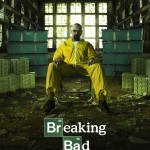Tags
Related Posts
Share This
All ‘Bad’ Things Must End
 “Guess I got what I deserved,” sang Pete Ham from Badfinger’s 1971 single “Baby Blue,” over Breaking Bad’s final moments. And despite Walter White’s final string of mini-victories, his death was the only proper conclusion.
“Guess I got what I deserved,” sang Pete Ham from Badfinger’s 1971 single “Baby Blue,” over Breaking Bad’s final moments. And despite Walter White’s final string of mini-victories, his death was the only proper conclusion.
“Felina” opens back in New Hampshire with Walt trying to steal a parked car. Police lights shine from behind and for the first time in memory Walt prays for the chance to get back to the ABQ. The police leave and through divine intervention the car keys slip from the visor. Walt starts the car, Marty Robbins’s “El Paso” blares from the stereo, and for the last time, audiences hear the opening theme.
Fans were worried leading up to the finale, having felt wronged by show-runners before (Damon Lindelof’s Lost, David Chase’s The Sopranos), but having seen the episode twice now, I feel that there is only one word to describe Breaking Bad’s finale: perfect.
Vince Gilligan, and his team of merry writers, were able to produce a finale that was both thematically and structurally pleasing. Some have argued that storylines were wrapped up too neatly, but I would argue in the age of cut to blacks, and lumberjacks, true closure is refreshing.
The standout moment of this episode has to be Walt’s scene with Skyler. Set in her new dingy apartment, Skyler tells Walt he has five minutes to talk. Walt gives Skyler the GPS coordinates that will lead the DEA to Hank and Gomez, hoping that the coordinates will be a good bargaining chip to get her off the hook. He also starts to tell her why he did what he did.
“Stop, if I have to hear one more time that you did this for your family-” says Skyler.
“I did it for me,” Walt says to a stunned Skyler. “I like it. I was good at it. And, I was really… I was alive.”
One of Walt’s defining characteristics throughout the show was his inability to face the truth. To justify all of his actions, regardless of their moral depravity. But in the moment where he finally tells the truth, for Skyler, as well as the audience, there is relief. In no way was Walt redeemed; he’s caused so much pain and destruction to those around him to ever be redeemed, but it completes the tragic series of events. The hero finally recognized he was the villain.
There was plenty of relief this episode for fans. Walt blackmails Gretchen and Elliot into leaving Walt’s $10 million into a trust for Jr.; with the help of Badger and Skinny Pete (“I don’t know, this all seems kind of shady, like, morality wise.”); Walt uses Chekov’s Ricin against the ever-deserving Lydia; Walt’s rigged M60 takes down Uncle Jack’s (Michael Bowen) entire Neo-Nazi crew; Jesse strangles Todd with his own chains; and Walt kills Uncle Jack in a masterfully similar way that Uncle Jack killed Hank in Ozymandias.
Jesse’s refusal to shoot Walt in the end was a fitting conclusion to his arc. He finally refused to do Mr. White’s bidding. The final shot of his screaming and crying, blazing out of the Neo-Nazi compound, was the perfect mixture of happiness, shock, anger and relief. As a long time fan, I was happy that there was no trip to Belize.
In the end, Breaking Bad is Walt’s story. His casual stroll through the Neo-Nazi meth lab, lovingly caressing his tools, while police sirens blared, was a fitting end to his life. He died with what he loved.
I’m a fan of television. My throat dried as Stringer died, my heart skipped a beat when Tony cut to black. But, without a single doubt in my mind, Breaking Bad is the greatest television series of all time.






 Jackalope Magazine is the student magazine of Santa Fe University of Art and Design. Building on the interdisciplinary nature of our education, we aim to showcase the talent of our university and character of our city.
Jackalope Magazine is the student magazine of Santa Fe University of Art and Design. Building on the interdisciplinary nature of our education, we aim to showcase the talent of our university and character of our city.
Recent Comments